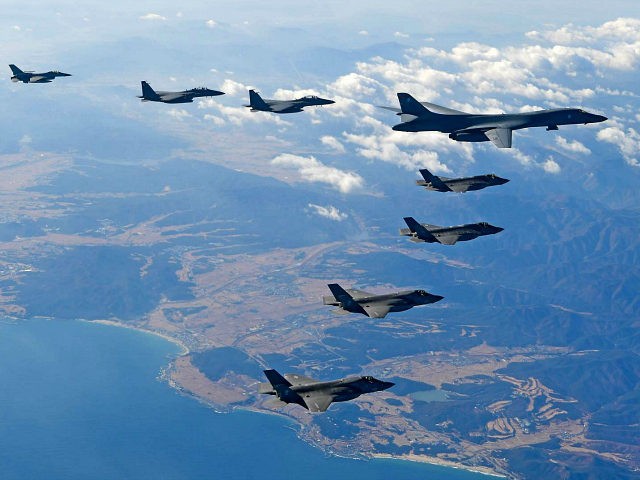President Donald Trump and South Korean President Moon Jae-in decided in a phone conversation on Thursday to suspend joint U.S.-South Korean military drills during the 2018 Winter Olympics in a diplomatic overture to North Korea, which constantly complains about such exercises.
NBC News reports that Trump and Moon also “discussed possible bilateral talks between North and South Korea ahead of the games, which are due to begin in Pyeongchang on Feb. 9.”
“We will work closely with the United States during the process of inter-Korean dialogue. We are confident that this process will help to create an atmosphere of dialogue between the United States and North Korea to resolve the North Korean nuclear issue,” Moon said in a statement.
Moon also mentioned that the U.S. delegation to the Winter Olympics would include members of President Trump’s family.
The U.S. Defense Department expressed support for the decision. It would evidently delay a portion of the massive Foal Eagle annual exercise, which runs between February and April, and can involve nearly a quarter-million U.S. and South Korean troops.
President Moon floated the idea of delaying the exercises in December, but U.S. Defense Secretary James Mattis was cool to the idea. “The rescheduling of exercises will be, as always, subject to both countries. If a pause is, I’m pausing them for a period of time because of a diplomatic issue or something, no, I don’t anticipate that right now,” he said at the time.
As recently as Thursday morning the commander of U.S. forces in South Korea, General Vincent K. Brooks, was telling an audience Seoul to curb their expectations for North Korea’s tentative diplomatic outreach over the past few days.
“We can be generally pleased by the recent overtures that happened. But we must keep our expectations at the appropriate level,” he said.
Brooks noted North Korea’s longtime strategy of using diplomatic maneuvers as delaying tactics and wedges to create space between South Korea, the United States, China, Japan, and Russia. He, therefore, stressed the importance of an “ironclad and razor-sharp” operational alliance between America and South Korea, especially during the intermittent moments when North Korea signals it is willing to talk.
The Washington Post notes that the U.S. government has been hearing rumors of an impending North Korean missile test, and wanted a firm commitment from North Korea to refrain from such provocations, while the Moon administration seemed more eager to take advantage of the diplomatic opportunity presented by the Winter Olympics without preconditions.
The New York Times, however, finds a good deal of skepticism among South Koreans as well:
Many in the country are mindful of how the so-called sunshine policy of two previous progressive leaders, Kim Dae-jung and Roh Moo-hyun, failed to curb North Korea’s nuclear ambitions, and remain wary of its revival. As Mr. Moon learned from his predecessors’ experiences, any South Korean leader accused of risking the alliance with Washington in trying to improve ties with the North could become a lightning rod of conservative ire.
“If there are still those who think they can solve the North Korean nuclear problem and problems between the South and the North through dialogue, they must be crazy,” said Yoo Dong-ryul, a right-wing director of the Seoul-based Korea Institute for Liberal Democracy.
While most South Koreans today favor dialogue and peaceful accommodation with North Korea, many also fear that hastily engaging and granting the North economic concessions would throw a lifeline to Mr. Kim just as sanctions are squeezing his government.
The NYT cites South Korean officials who said the Winter Olympics might represent the last real opportunity to use diplomacy to prevent North Korea from developing nuclear missile technology, but also Pyongyang’s last chance to use offers of diplomacy to fracture the international coalition arranged against it.
Also, there are concerns in both Seoul and Washington that dictator Kim Jong-un might push for even more concessions, emboldened by the suspension of military exercises he has so often complained about. If further concessions are granted, it might not only break up the international coalition but infuriate South Korean voters, weakening Moon’s position. This danger would become especially acute if North Korea reacts angrily to the resumption of U.S.-South Korean military exercises after the Olympics, or stages another provocative weapons test after pocketing further concessions.

COMMENTS
Please let us know if you're having issues with commenting.